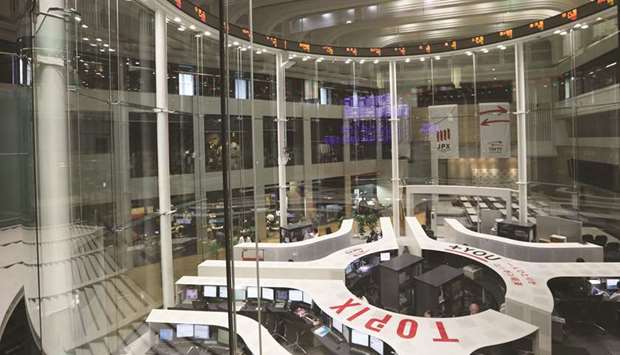Markets mostly fell yesterday following a chaotic US presidential debate in which Donald Trump again suggested the election could be fraudulent, although hopes for a second stimulus out of Washington provided a little support.
Another round of healthy Chinese data also lifted optimism, but the ever-present gloom of rising virus infections and deaths continues to dampen the mood on trading floors as dealers fret over the re-imposition of containment measures in key economies.
Trump and Joe Biden traded personal barbs in the first of three debates ahead of the November 3 vote, with observers saying the president needed a strong showing as he trailed in most national and battleground polls.
The much-anticipated match-up, however, descended almost immediately into a shouting match, with little of substance emerging from either man.
When asked if they pledged to urge calm and refrain from declaring victory if the election result is not immediately known, Biden said “yes”, while Trump would not commit, saying that if he saw “tens of thousands of ballots being manipulated, I can’t go along with that”.
The president’s claims about voter fraud have raised concerns among investors that the result could be drawn out and fuel uncertainty.
Most observers were left disappointed, and Aaron Kall, a presidential debate specialist at the University of Michigan, told AFP: “This will go down as one of the worst debates in history.”
“The market is starting to price in potentially a blue sweep,” Jimmy Chang, at Rockefeller & Co LLC, told Bloomberg TV, referring to Democrats winning the White House and both houses of Congress.
He added that while such a scenario could lead to higher taxes, it would also likely see a bigger stimulus package being passed.
On Tuesday, a top aide to Democratic House Speaker Pelosi said the lawmaker had spoken for a second straight day with Treasury Secretary Steven Mnuchin, and the two agreed to continue negotiating, raising hopes they could break a months-long impasse.
Pelosi said she was “hopeful” an agreement could be reached, though her party and Republicans remain miles apart on their proposals.
The Democrats’ “tabling of a $2.2tn fiscal support package hasn’t drawn any favourable response as yet from the Republican side,” said National Australia Bank’s Ray Attrill.
“Trump’s economic adviser Kudlow said that the true cost of the Democrats’ package is more like $2.6tn and about one-third of it looks like not being strictly tied to the pandemic.
Talks are expected to continue but confidence in a deal before the pre-election Congressional recess is not running high.” The news was not enough to help US markets with all three main indexes ending in the red.
And while Asian markets got off to a good start, they were unable to maintain the momentum.
Hong Kong rose 0.8%, helped by data showing factory activity in China improved in September, indicating that the recovery in the world’s number two economy was on track.
Mumbai, Taipei, Manila and Wellington also edged up.
There were steep losses in Tokyo, down more than 1%, and Sydney, more than 2%, while Shanghai, Singapore, Jakarta and Bangkok were also in the red.
In Tokyo, the Nikkei 225 closed down 1.5% to 23,185.12 points; Hong Kong – Hang Seng ended up 0.8% to 23,459.05 points and Shanghai – Composite closed down 0.2% to 3,218.05 points yesterday.

Employees work on the trading floor of the Tokyo Stock Exchange. The Nikkei 225 closed down 1.5% to 23,185.12 points yesterday.
